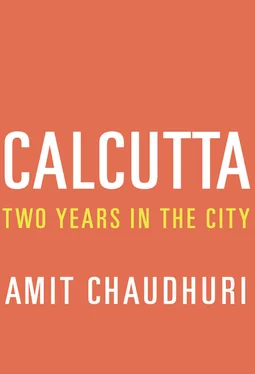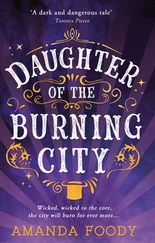J. P. Medico.
Here was the pharmacy! But the corrugated shutter was down three-quarters of the way. I bent down and could sense there were people there; I was told from within that they’d reopen at five o’clock. Yes, I think it’s true that some pharmacies — and maybe pharmacies alone — take a long siesta in Calcutta. Do they do such bad business in the afternoon that even keeping the ceiling fan and tube light on makes little sense? “Open up please! We’ve come a long way!” I said, taking on the moral tone of my class, the educated class, impatient with the laxity of the poorly educated. Baby Misra seemed quietly relieved and respectful upon seeing me in this incarnation. To my surprise, the shutter went up with a juddering clatter, and the three of us stepped into a small space that, here and there, displayed cheerful signs for shampoos and ointments. One of these showed a radiant little boy with a bottle saying HORLICKS, and, soon after the two men (a younger and an older) had glanced at the prescription (Baby Misra’s treatment was very simple: calcium tablets and vitamins), young Jitinder pointed to the sign and, charmingly, without the pressing ways of other children, indicated he wanted the Horlicks. The wisdom of asking for Horlicks rather than chocolates or lozenges was interesting: did he know the former had greater nutritional value — or did he like the picture of the child? The two men, who were giving us the vitamins — annoyingly, they’d run out of calcium tablets — smiled without, however, being certain of how much to smile; they could tell Jitinder wasn’t my son and were balancing a demand from an undeserving down-at-heel boy (albeit decently dressed in white shirt and shorts, armed with a tiny stick) with the possibility of a further sale. Baby Misra was having none of this; unimpressed by Jitinder, she collected him from the shelf she’d allowed him to perch on, and placed him on the ground unfussily, as if they had to be on their way. The manner in which she did this acknowledged to me: “I know your patience is wearing thin.” I paid for the vitamins without a word.
We walked back some distance towards Park Street, and, near Ramayan Shah’s “hotel,” where I thought I’d stop for a chat, I bid the lovely Baby Misra and her handsome boy farewell. On our way, while passing a dingy-looking eating place, Jitinder, with the candour of a child, growing gradually familiar with me, had expressed an interest in chow mein. This time, with the inexorable softening of the maternal heart, Baby Misra looked at me — in expectancy and faith. I felt a small constricting of my own heart immediately, and, for a second, felt this mother and child I hardly knew were threatening to deluge my life. Simultaneously — it was impossible to disentangle it from this anxiety — I thought buying Jitinder chow mein was an excellent idea; only the fact that he’d asked me made me resistant to it. We went in, and Jitinder had vegetable chow mein—“chow,” as it’s called in Calcutta, the commonest, most munificent street food, limp white noodles tossed around in oil and soya sauce with gratings of vegetable or chicken (I myself have never tasted it) — and then, deliberately to disarm me, said, “Thank you,” in the way of one who knows only those two words in the English language, and uses them at moments such as this one.
* * *
“You shouldn’t have given her the money,” said Munna moodily. “She’ll never spend it on medicine.”
By now, I’d seen the back of Baby Misra; we’d had a final conference near Ramayan Shah’s. I’d offered to drop her at a “free” hospital near Number 4 Bridge, for treatment and X-rays, and she’d refused. Maybe it was time to get back to Howrah. She, in turn, had asked me if I knew of any jobs going; “You can always tell these people if you need me,” I said, pointing my chin towards Ramayan Shah’s ramshackle world, as if it were an institution I’d have an enduring association with. She tilted her head sideways — our sweet Indian gesture of assent — and asked if she could have money to buy the calcium tablets.
Soon after this, Munna (clearly a popular Bihari name) passed his remark — he’d ignored me before, absorbed in his aluminium platter of rice and vegetables, but now was unexpectedly, if intrusively, interested — with the air of a persecutor who turns out to be menacingly concerned about your welfare. What do you care? I thought. A mistake one makes constantly is to judge people by their looks — it’s the infallible urge to stereotype, conflated inextricably with the urge to fictionalise — and Munna had the large, moustached, glowering features that convey, and incite, animosity. But, as you grow older, experience tells you to distrust your first impression (this can be fatal when it comes to people who have an aura of villainy, and very useful in connection with those who have an air of “niceness”); so I thought I’d engage with Munna in spite of not wanting to.
“That boy’s half-mad,” he said, as he scooped up rice from the dented plate. The boy he’d described smiled enigmatically. He was too busy to be bothered: splashing the utensils, dicing the aubergine. He turned out to be Ramayan Shah’s son; he said he was “fourteen or fifteen” years old, but looked younger — small, enigmatic, and spring-like. As I took in his features from different angles, I did see that he looked a bit like his father; but lacked, naturally, his air of calm acceptance. Clearly, Munna and he didn’t like each other. The boy was cheery but homesick (he missed the “khelna kudna,” the abandon, of his village); and Munna was a bully.
“He eats a kilo and a half of rice every day,” said Munna, rapidly consuming rice himself. “He doesn’t eat food: food eats him.”
The boy’s name was (probably appropriately) Hridayanand—“joyful of heart.” His response to my queries was one of gobsmacked (this ugly English word is the only one that comes readily to mind) disbelief; he’d never encountered such a specimen before. Munna’s was supercilious distaste and suspicion. He wasn’t sure if I was a scam-artist who was going to exploit him, or whether I was an imbecile up for exploitation — the perpetual and urgent Indian dilemma. Nevertheless, as if he were reluctantly doing me a good turn, he volunteered a potted life history. He had been “here”—the word could have meant anything — since 1986. That was in one of the worse decades in Calcutta’s history, even worse in some ways than the Naxal years, when middle-class children, like the children in Victorian novels, read for their finals by candlelight, when the city seemed to implode and the interminable power cuts earned the chief minister Jyoti Basu — whose first name means “light”—the nickname Andhakar or Darkness Basu. Since such was at least the middle-class perspective on 1986, it made me wonder how much worse it would have been in Munna’s home town to make the move. Everyone around “here” was Bihari, he proclaimed: a generalisation, of course, but with a germ of truth in it.
They — four of them — slept on these latticed string cots and narrow benches — the rudimentary furniture that occupied the pavement at various angles. He cleaned cars and earned one hundred and fifty rupees a day (almost double the minimum wage in this country of starvation deaths and millionaires); and sent back two and a half thousand monthly. At home in Munger zilla, he had two daughters.
“Police cause trouble,” he said, with the wariness of one whose domain depends upon offering small bribes to the law.
No, I didn’t have a great deal to learn from Munna — nothing that, by now, I didn’t already know. But Munna was aware of the value of his time and information. “Arrey, at least give me something for a cup of tea!” he said as I got up to go — careless of the decorousness that had characterised the others I’d socialised with till now at Ramayan Shah’s. Nagendra was ironing away within earshot, and his expression could have meant anything: “I wish I was somewhere else,” or “Serves him right!”
Читать дальше












